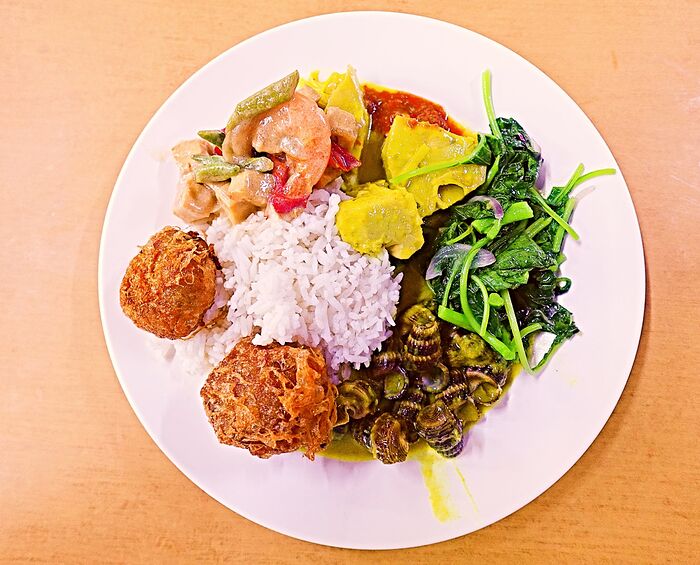Breakfast at Puteri in Taman Tun Dr Ismail (TTDI), owned by Rubiah Suparman, a Singapore-born ex-film and TV actress who was very popular in the 1980s, before she got married, quit show business and decided to open a restaurant.
Rubiah (standing up), with her older sister who helps to manage the restaurant, when we saw her last week. Still as elegant as ever, she is 78 this year.
Rubiah during her hey-days in the early-80s when she ruled the roost in Malaysia’s film world. She starred in eight films and made hundreds of TV drama appearances. She won the Best Actress award in the 1983 Malaysian Film Festival.
The original Puteri restaurant opened in 1984 in Brickfields, which she co-owned with award-winning songwriter-lyricist, fellow Singapore-born Habsah Hassan. The successful restaurant operated for 36 years until they decided to close it down during the worst COVID lockdown period in 2020. This surviving TTDI branch opened in 2000.
Ethnic Malay food is worlds away from the foods of the Chinese-Malaysian and Indian-Malaysian minorities. The Malays are 100% Muslims and they constitute about 60% of the Malaysian populace. Their food is strictly halal, and has a whole range of options which one can explore.
What we had last Thu morning:
- Nasi lemak - the quintessential Malay breakfast dish. This Michelin Guide article has a detailed description of nasi lemak:
https://guide.michelin.com/my/en/article/features/what-is-nasi-lemak
We opted for beef rendang for the protein side. The standard, basic nasi lemak serving comes with coconut milk-infused rice, the indispensable sambal, crisp-fried ikan bilis (anchovies), toasted groundnuts, fresh cucumber, and a hard-boiled egg.
- Nasi campur - essentially translates as “mixed rice”, the quintessential Southeast Asian plate meal of steamed white rice, accompanied by a plethora of side-dishes which the diner chooses from a display counter of cooked dishes. It has its equivalence in Thailand, Indonesia and the Philippines.
For our nasi campur plate that morning, we chose perkedel (potato-beef croquettes), siput sedut (curried mud creepers), stir-fried spinach, curried young jackfruit, and spiced shrimps with coconut cream.
- Laksa Johor
Each Malaysian state has its own take on the laksa. Per the recent Michelin Guide article on Penang’s asam laksa, it was stated that:
“In Malaysia, the culinary term “laksa” generally refers to a rice noodle dish smothered with an assertively flavoured broth, ranging from Malacca’s Nyonya laksa with its spicy shrimp-based potage, enriched with coconut milk, to the mysterious Sarawak laksa, with its intoxicating chicken brew, suffused with dark-hued, coriander-inflected Bornean spices.”
Johore laksa’s uniqueness lie in its use of Italian pasta in place of the usual rice noodles used in other states’ versions. The practice was started by its maverick ruler, Sultan Abu Bakar, who ruled Johore from 1862 to 1895. A prolific traveler and ardent admirer of all things British (he actually died in Bailey’s Hotel, London), he came across pasta during his visit to Rome and the Vatican in April 1885, when he met King Umberto I of Italy and Pope Leo XIII. Upon his return to Johore, the sultan had instructed his palace chefs to replace the usual thick rice noodles with spaghetti. The gravy remained the traditional spiced, fish-based laksa gravy. Thus, the Johore laksa was born.
Johore is the southernmost state in Malaysia, and separated from Singapore by a one-mile causeway bridge. Culturally and linguistically, the Singapore-Malays and Johore-Malays are one and the same. Hence, Singapore-born Rubiah Suparman’s take on Johore laksa was 100% authentic and unmissable if one comes here.
- Roti canai - this is the Malay adaptation of Indian paratha, but lighter and crispier. The dhal/lentil gravy is blander than South Indian ones, and has a dollop of sambal on top for the fiery heat which Malays simply cannot do without.
Quite a substantive breakfast.
Address
Restoran Puteri
12, Jalan Datuk Sulaiman, Taman Tun Dr Ismail, 60000 Kuala Lumpur, Malaysia
Tel: +603-7728 9294
Operating hours: 6.30am to 5pm Tue -Sat, 6.30am to 3pm Sunday. Closed on Mondays.












